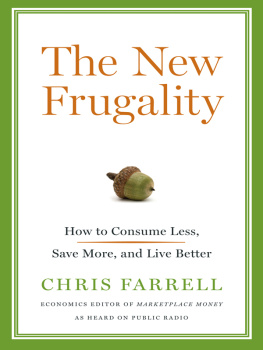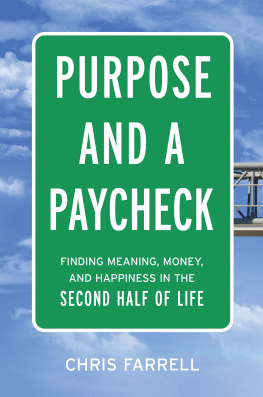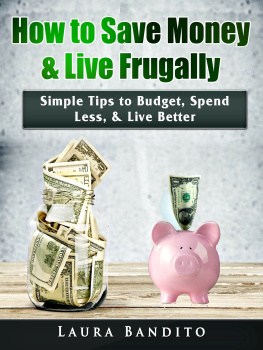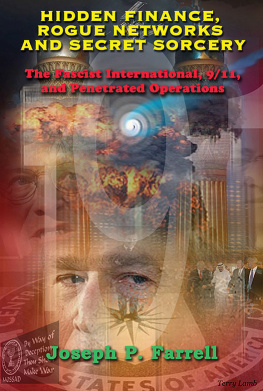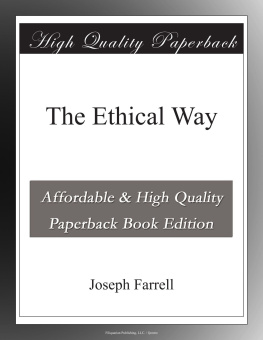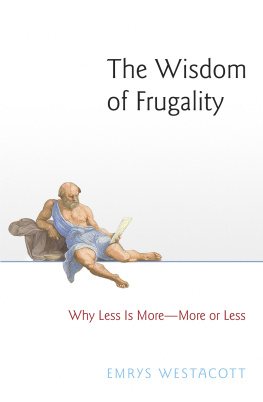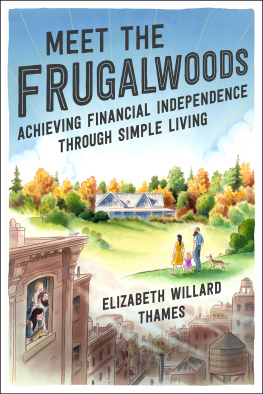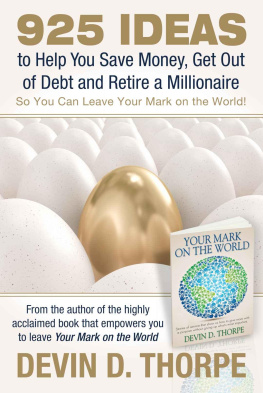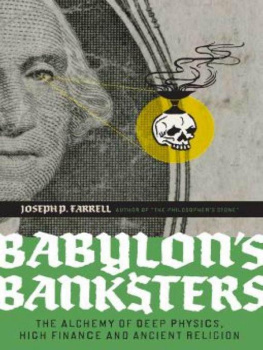I owe an enormous debt of gratitude to many people. Id like to thank Suzanne Woolley, senior editor in the personal-finance department at BusinessWeek. Shes a wonderful editor, a constant source of insight and cheer. She helped me im mensely with the book. Michael Mandel, chief economist at BusinessWeek, is a friend and fount of ideas that influenced the shape of this book. Mark Alfuth, chief financial officer at American Public Media, carefully went through the manuscript with me. His advice was invaluable. Stephen Smith, executive editor and host of American RadioWorks at American Public Media, is a good friend and colleague, always wise in counsel, with a knack for knowing when its time for some humor. He also wields a good red pencil. I received perceptive comments on a rough work in progress from Peter Clowney, Laurie Stern, Ron Jepperson, Robert Barker, and Lisa Kane.
Marketplace Money is a one-hour personal-finance show nationally syndicated by APM. I learned a lot from a terrific group of colleagues, host Tess Vigeland, senior producer Deborah Clark, and assistant producers Stephen Hoffman and Eve Troeh. J. J. Yore, vice president of programming and executive producer at Marketplace, cheerfully supported the project (occasionally shaking his head and saying, If you really want to do this to yourself...). Im grateful for the support of APM, especially Bill Kling, Jon McTaggart, Judy McAlpine, and Kate Moos.
There are so many people that Id like to thank for their counsel and ideas about personal finance over the years. I cant list them all, but there are a few Id like to highlight. Among the financiers that have instructed me are Professor Zvi Bodie of Boston University, Professor Meir Statman of Santa Clara University, Professor Burton Malkiel of Prince ton University, and Professor Jeremy Siegel of the Wharton School. In addition, I am indebted to Jack Bogle, the found er of Vanguard; Ross Levin, certified financial planner and head of the financial-planning firm Accredited Investors; Ruth Hayden, financial educator at Ruth L. Hayden Associates; Eric Tyson, personal-finance author; and Michael Mauboussin, chief investment strategist at Legg Mason Capital Management. A special thanks to the late Peter Bernstein, economic historian and phi los opher of risk.
I am extremely lucky to work with the book agent Joelle Delbourgo. Thanks to Peter Ginna, publisher at Bloombury Press and Pete Beatty, associate editor at Bloomsbury. I enjoyed their editing and comments. They managed to stay cheerful and supportive even as deadlines were missed. The only reason I even had the opportunity to write this book was the medical care I got after being diagnosed with colon cancer in spring 2007. Following colon surgery and six months of chemo, Im doing well. I cant sing the praises enough of the nurses and doctors at Abbot Northwestern Hospital and Minnesota Oncology. Primary-care physician Scott Flaata, surgeon Dr. Karim Alavi, oncologist Dr. Burton Schwartz, nutritionist Lisa Kane, and all the nurses and doctors that treated me, thank you.
Finally, Id like to thank the two best young men I know and love, my sons, Peter and Connor.
By the same author
Right on the Money: Taking Control of Your Personal Finances
Deflation: What Happens When Prices Fall?
The New Frugality
How to Consume Less,
Save More, and Live Better
Chris Farrell

BLOOMSBURY PRESS
New York Berlin London
Copyright 2010 by Chris Farrell
All rights reserved. No part of this book may be used or reproduced in anymanner whatsoever without written permission from the publisher except in the case ofbrief quotations embodied in critical articles or reviews. For information addressBloomsbury Press, 175 Fifth Avenue, New York, NY 10010.
Published by Bloomsbury Press, New York
LIBRARY OF CONGRESS CATALOGING-IN-PUBLICATION DATA
Farrell, Chris
The new frugality : how to consume less, save more, and live better / Chris
Farrell.1st U.S. ed.
p. cm.
Includes index.
ISBN-13: 978-1-59691-660-9 (hardcover : alk. paper)
ISBN-10: 1-59691-660-5 (hardcover : alk. paper)
1. Finance, Personal. 2. Saving and investment. I. Title.
HG179.F363 2010
332.024dc22
2009030375
This publication is designed to provide accurate and authoritative information inregard to the subject matter covered. It is published with the understanding thatthe publisher and author are not engaged in rendering legal, accounting, or otherprofessional service. If legal advice or other professional advice, including financial,is required, the services of a competent professional person should be sought.
First published in the United States by Bloomsbury Press in 2010
This e-book edition published in 2010
E-book ISBN: 978-1-60819-169-7
www.bloomsburypress.com
Contents
A dollar is not value, but representative of value, and at last,of moral values... Wealth is mental; wealth is moral.
Ralph Waldo Emerson
Im a card-carrying optimist, but it had been a rough patch in February 2009. It was cold, which isnt surprising since I live in Minnesota and during winter a slight pall of gloom touches everyone living on the frozen tundra. Even Garrison Keillor, the radio bard of A Prairie Home Companion, seemed more Lutheran-tinged depressed than usual during his shows in St. Paul. But the February in America pessimism ran far deeper than the weather and season.
The stock market kept hitting new bear-market lows. Companies were laying off workers at a dismaying rate. Colleagues at American Public Media, the St. Paulbased public-radio programming behemoth, were coming by my office worried about their jobs and retirement savings. More listeners than ever were seeking financial advice from MarketplaceMoney, the nationally syndicated public-radio show I work on as economics editor and financial adviser. Many of the stories were heartbreaking: a foreclosed home; a small business gone belly-up; an aged parent struggling to get by on a shrunken portfolio; a college graduate with no job and lots of student loans. And my car was making strange noises. I knew an expensive bill lay in my near future.
In other words, it was time for a beer. I headed off to the Local, an Irish pub in downtown Minneapolis, a favorite spot of mine. The beer came, and it tasted good. I cant really say why, but, one eye on a televised sporting event, I started thinking about an afternoon with my dad toward the end of his life. Tall, with broad shoulders, he had a big Irish head with white hair, and an erect, military bearing. Of course, thats how I remember him.
But that day he was eighty-three years old and frail in Georgetown University Hospital. His leg had been amputated. The surgery hadnt gone well, and the end was near. My mom, my oldest son, and I sat around his hospital bed. Normally reticent, he reflected on his life with an occasional prompt from my mom. He talked about his grandparents leaving Ireland and illegally entering the United States by walking across the Canadian border; growing up in the Irish section of Yonkers, New York, in the Depression; running aground in the Red Sea during World War II as a navy midshipman; the naval battle of Leyte Gulf near the Philippines; surviving a kamikaze attack; running spies into Eastern Europe and Russia during the Cold War; and the mob on the waterfront. Some of his stories I had heard before, but much of it was new to me. What was comfortably familiar was his laughing so hard at times that tears came.
For us sitting around the hospital bed, it was like listening to a reading of a novel, except it was all true. Still, what Ive carried with me ever since is the moment when he looked at us and said matter-of-factly, Ive lived a good life.

